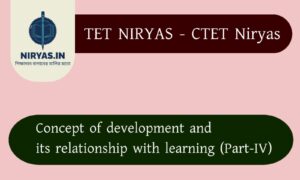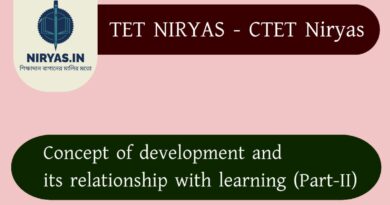Relationship between Development and Learning
Relationship between Development and Learning :
CTET is a central government-run examination system, where the exam is conducted for Paper-I and Paper-II. Candidates who pass Paper-I are considered eligible to teach in Primary Schools and those who pass Paper-II are considered eligible to teach in Upper Primary Schools. Candidates with CTET pass certificate can apply for teaching jobs in KVs, NVs, ERDO and National Army schools. Many private schools in India also select candidates on the basis of CTET score. At present, if you have passed CTET, you can also apply for teaching jobs in schools in different states, in this case, it is not necessary to pass the TET conducted by the state government. This current post “Relationship between Development and Learning” discusses the topic Concept of Learning; Concept of development and its relationship with learning Part-III of Child Psychology included in the CTET Paper-I syllabus. The entire topic will be completed in several parts, so click Next to read the Next Part:
Relationship between Development and Learning :
⟽ Previous Part : Concept of Learning
➲ Relationship between Development and Learning : The relationship between development and learning is complex and reciprocal. Development influences learning, as cognitive, emotional, and social development affect an individual’s ability to learn. Conversely, learning influences development, as new experiences and knowledge shape an individual’s development. In this section, we will explore the reciprocal relationship between development and learning.
➲ Development Influences Learning : Development plays a significant role in shaping an individual’s ability to learn. Cognitive development, ☆ For example, affects an individual’s ability to process and retain information. Emotional development influences an individual’s motivation and engagement in learning, while social development affects an individual’s ability to interact with others and form meaningful relationships.
❖ Cognitive Development : Cognitive development refers to the growth and maturation of mental processes, including perception, attention, memory, language, and problem-solving abilities. Cognitive development influences learning by affecting an individual’s ability to process and retain information.
➥ Here are some ways in which cognitive development influences learning:
⦿ Perception: Cognitive development affects an individual’s ability to perceive and process information from their environment.
⦿ Attention: Cognitive development influences an individual’s ability to focus and maintain attention on a task or activity.
⦿ Memory: Cognitive development affects an individual’s ability to store and retrieve information from memory.
⦿ Language: Cognitive development influences an individual’s ability to understand and use language to communicate with others.
⦿ Problem-Solving: Cognitive development affects an individual’s ability to think critically and solve problems.
❖ Emotional Development : Emotional development refers to the growth and maturation of emotional processes, including the ability to recognize, understand, and regulate emotions. Emotional development influences learning by affecting an individual’s motivation and engagement in learning.
➥ Here are some ways in which emotional development influences learning:
⦿ Motivation: Emotional development affects an individual’s motivation and engagement in learning.
⦿ Emotional Regulation: Emotional development influences an individual’s ability to regulate their emotions and manage stress.
⦿ Self-Awareness: Emotional development affects an individual’s self-awareness and ability to recognize their own emotions and needs.
⦿ Empathy: Emotional development influences an individual’s ability to understand and empathize with others.
❖ Social Development : Social development refers to the growth and maturation of social skills and relationships, including communication, cooperation, and conflict resolution. Social development influences learning by affecting an individual’s ability to interact with others and form meaningful relationships.
➥ Here are some ways in which social development influences learning:
⦿ Communication: Social development affects an individual’s ability to communicate effectively with others.
⦿ Cooperation: Social development influences an individual’s ability to work collaboratively with others.
⦿ Conflict Resolution: Social development affects an individual’s ability to resolve conflicts and manage relationships with others.
⦿ Social Skills: Social development influences an individual’s ability to interact with others and form meaningful relationships.
In summary, development plays a significant role in shaping an individual’s ability to learn. Cognitive development influences learning by affecting an individual’s ability to process and retain information. Emotional development influences learning by affecting an individual’s motivation and engagement in learning. Social development influences learning by affecting an individual’s ability to interact with others and form meaningful relationships.
➲ Learning Influences Development : Learning also plays a significant role in shaping an individual’s development. New experiences and knowledge can shape an individual’s cognitive, emotional, and social development, leading to changes in behavior, cognition, and emotions.
❖ Cognitive Development : Learning can influence cognitive development by providing new experiences and knowledge that challenge and shape an individual’s mental processes.
➥ Learning can influence cognitive development in several ways:
⦿ New Experiences: Learning provides new experiences that challenge and shape an individual’s mental processes, such as problem-solving, critical thinking, and decision-making.
⦿ Knowledge Acquisition: Learning new knowledge and skills can enhance cognitive development by increasing an individual’s understanding of the world and their ability to navigate complex situations.
⦿ Cognitive Flexibility: Learning can promote cognitive flexibility by helping individuals to adapt to new situations, think creatively, and consider multiple perspectives.
⦿ Metacognition: Learning can also promote metacognition, which is the ability to reflect on and evaluate one’s own thinking and learning processes.
❖ Emotional Development : Learning can influence emotional development by providing new experiences and knowledge that help an individual develop emotional regulation and well-being.
➥ Learning can influence emotional development in several ways:
⦿ Emotional Regulation: Learning can help individuals develop emotional regulation skills, such as managing stress, anxiety, and other emotions.
⦿ Emotional Intelligence: Learning can promote emotional intelligence, which is the ability to recognize and understand emotions in oneself and others.
⦿ Empathy and Compassion: Learning can foster empathy and compassion by helping individuals to understand and appreciate the perspectives and experiences of others.
⦿ Self-Awareness: Learning can promote self-awareness, which is the ability to recognize and understand one’s own emotions, values, and motivations.
❖ Social Development : Learning can influence social development by providing new experiences and knowledge that help an individual develop social skills and relationships.
➥ Learning can influence social development in several ways:
⦿ Social Skills: Learning can help individuals develop social skills, such as communication, cooperation, and conflict resolution.
⦿ Relationships: Learning can foster positive relationships with others, including peers, teachers, and family members.
⦿ Social Norms: Learning can help individuals understand and navigate social norms, including cultural and societal expectations.
⦿ Community Engagement: Learning can promote community engagement and participation, including volunteering, activism, and other forms of civic engagement.
In summary, learning plays a significant role in shaping an individual’s cognitive, emotional, and social development. By providing new experiences, knowledge, and skills, learning can promote cognitive flexibility, emotional intelligence, and social competence.
➲ Reciprocal Relationship between Development and Learning : The relationship between development and learning is reciprocal, meaning that development influences learning, and learning influences development. This reciprocal relationship is ongoing and dynamic, with development and learning influencing each other throughout an individual’s life.
➲ Implications for Practice : Understanding the reciprocal relationship between development and learning has significant implications for practice, including:
প্রাথমিক টেট প্রস্তুতির জন্য ক্লিক করুনঃ
উচ্চ প্রাথমিক টেট প্রস্তুতির জন্য ক্লিক করুনঃ
❖ Instructional Design : Instructional design should take into account the developmental needs and abilities of learners, as well as the learning objectives and outcomes.
❖ Teaching Methods : Teaching methods should be tailored to the developmental needs and abilities of learners, as well as the learning objectives and outcomes.
❖ Assessment and Evaluation : Assessment and evaluation should be designed to measure learning outcomes and provide feedback to learners, as well as to inform instructional design and teaching methods.
➲ Theories of Development and Learning : Several theories of development and learning attempt to explain the complex and reciprocal relationship between development and learning, including:
❖ Piaget’s Theory of Cognitive Development : Piaget’s theory posits that cognitive development occurs through a series of stages, each characterized by increasingly complex mental processes.
❖ Vygotsky’s Theory of Social Constructivism : Vygotsky’s theory posits that learning occurs through social interaction and collaboration, with more knowledgeable others providing scaffolding and support.
❖ Bandura’s Theory of Social Learning : Bandura’s theory posits that learning occurs through observation and imitation of others, with reinforcement and punishment playing a significant role in shaping behavior. Download : Paper-I CDP eBook
➲ Conclusion : In conclusion, the relationship between development and learning is complex and reciprocal. Development influences learning, as cognitive, emotional, and social development affect an individual’s ability to learn. Conversely, learning influences development, as new experiences and knowledge shape an individual’s development. Understanding this reciprocal relationship is crucial for promoting effective learning and development throughout an individual’s life. ➣ Next Part
⟽ Previous Post : Pushpa the Rule : Black Marketing of Red Sandalwood



